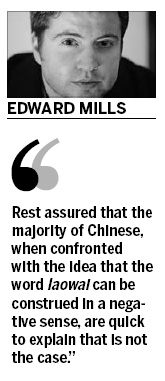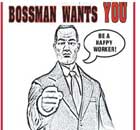Voices
What's in the word laowai?
(China Daily)
Updated: 2010-04-13 08:22
 |
Large Medium Small |

Laowai is one of the first words that Western people learn if they're spending time in China, especially if they spend a lot of time socializing with Chinese people.
It translates to "foreigner" in English and to the Chinese it means anyone who is not Chinese. It's not meant to be offensive; it's actually more inquisitive in nature.
With the opening up of China there has been quite an influx of us foreign types and the word has become more noticeable.
Many expatriates living in Beijing have even embraced the term. There is now a multitude of websites catering to foreigners living in Beijing that use "laowai" in the titles.
No matter whether they are concerned with online shopping, language learning, or personal discovery, you are likely to come across the term somewhere on the Web.
Even Beijing social networking sites aimed toward the non-Chinese population are apt to use the term, and you can be sure that the phrase laowai or foreigner will be a topic of great discussion, not always framed in a positive manner.
Few will attempt to deny the existence of cultural differences, however much some parts of Confucian thinking and Western morality overlap. They are outweighed by similarities, in my view, but nonetheless, differences exist.
However, the significant impact of contemporary American culture on Beijing is overtly noticeable. It seems there is an American fast food outlet on almost every corner and a popular American coffee chain store can be found even among the most traditional of Chinese tourist attractions.
No matter how popular they may be, one cannot help but feel they don't belong.
From movies to clothing brands, shopping facilities to restaurants, Western culture is undeniably becoming more popular here.
Some Chinese have even taken English so much to heart that they use it when talking - even on the subway to strangers - to the bemusement of locals and expatriates alike. So being foreign in Beijing obviously has an element of "cool" to it.
That said, one cannot help but feel that the term laowai deliberately places us non-Chinese at a distance. Something "foreign" has the connotation of being strange and unwelcome.
This has parallels at home, where the term "foreigner" is sometimes prefaced with an expletive and followed by the words "go back to your own country".
Racism in the West exists and the term "foreigner" is undeniably associated with it.
In China, expatriates are "foreigners" as far as the law is concerned, and that's fair enough. Legal terminology and status for non-nationals certainly shouldn't cause offense.
The United States reassuringly defines all those who are residing in the US but not holding citizenship as "aliens".
Rest assured that the majority of Chinese, when confronted with the idea that the word laowai can be construed in a negative sense, are quick to explain that is not the case.
As far as I'm aware, it is largely intended in a casual and neutral sense, with few intending it as a pejorative term.
So, I think it should be said that as most non-natives in China live very comfortable lives here, certainly compared with the average Chinese citizen, it should be possible for these "foreigners" to learn to cope with a word that has usually no negative connotations attached.







